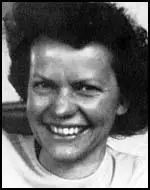Katherine Puening Dallet Harrison Oppenheimer

Katherine Puening, the daughter of an engineer, was born in Germany. Her mother was related to Queen Victoria and was once engaged to Wilhelm Keitel.
After studying at the Sorbonne, she moved to the United States and she married a Boston musician. She obtained a divorce in 1932 and soon afterwards met Joe Dallet, a member of the American Communist Party who was organizing the Steel and Metal Workers' Union in Ohio. He had also ran for political office in Youngstown.
Katherine married Dallet six weeks later. According to Cecil D. Eby, the author of Comrades and Commissars: The Lincoln Battalion in the Spanish Civil War (2007): "Her application for CP membership was turned down but she was allowed to join the YCL after an apprenticeship grinding out Party throwaways on a mimeograph machine and hawking the Daily Worker in Youngstown. The couple lived - ironically on relief checks - in a rundown boardinghouse while Joe ran for mayor of Youngstown on the CP ticket."
The marriage was not a success and in 1935 she moved to England to be with her father. However, she remained in contact with Joe Dallet and when he joined the Abraham Lincoln Battalion during the Spanish Civil War he wrote to her on a regular basis. Dallet was killed at Fuentes de Ebro in October 1937.
Katherine returned to the United States where she studied plant physiology at the University of California. She later married her third husband, a radiologist working in California.
In 1939 she met Robert Oppenheimer at a party. He ended his relationship with Jean Tatlock and after she obtained her divorce from her third husband, they were married in 1940. The couple had two children: Peter (1941) and Katharine (1943).
According to an article in Time Magazine: "Mrs. Oppenheimer made him have his suits pressed occasionally, and persuaded him to wear tweeds and even sport jackets in a variety of colors besides his traditional blue-greys. She got Robert to cut his hair shorter & shorter (he wears a crew cut now). He started eating three meals a day and stopped staying up all night except on rare occasions."
In 1943 Robert Oppenheimer was appointed director of the Manhattan Project where he worked with Edward Teller, Enrico Fermi, David Bohm, James Franck, Emilio Segre, Felix Bloch, Rudolf Peierls, James Chadwick, Otto Frisch, Eugene Wigner, Leo Szilard and Klaus Fuchs in developing the atom bombs dropped on Hiroshima and Nagasaki.
Oppenheimer was a victim of McCarthyism and in 1953 he was accused of being closely associated with communists in the 1930s and 1940s. This included his relationship with Jean Tatlock and his wife. A security hearing decided he was not guilty of treason but ruled that he should not have access to military secrets. As a result he was removed from the Atomic Energy Commission. This created great controversy and 493 scientists who worked on the Manhattan Project signed a protest against the verdict.
Robert Oppenheimer died of throat cancer on 18th February, 1967.
Primary Sources
(1) Time Magazine (8th November, 1948)
Until 1936, Oppenheimer had never even voted; he was "certainly one of the most unpolitical people in the world." But in the depression he watched young, finely trained physicists cracking up because they were unemployed; he also heard about relatives forced to leave Nazi Germany. Says Oppenheimer: "I woke up to a recognition that politics was a part of life. I became a real left-winger, joined the Teachers Union, had lots of Communist friends. It was what most people do in college or late high school. The Thomas Committee doesn't like this, but I'm not ashamed of it; I'm more ashamed of the lateness. Most of what I believed then now seems complete nonsense, but it was an essential part of becoming a whole man. If it hadn't been for this late but indispensable education, I couldn't have done the job at Los Alamos at all."
Comes the Revolution. It was at a Pasadena party in 1939 that Robert Oppenheimer, then 35, met Katherine Puening Harrison. A small, German-born brunette, Mrs. Harrison was the wife of a radiologist, and herself a graduate student in plant physiology at U.C.L.A. A year later, after the Harrisons were divorced, Kitty and Robert were married. Of the subsequent revolution in his habits, Oppenheimer says: "A certain stuffiness overcame me."
Mrs. Oppenheimer made him have his suits pressed occasionally, and persuaded him to wear tweeds and even sport jackets in a variety of colors besides his traditional blue-greys. She got Robert to cut his hair shorter & shorter (he wears a crew cut now). He started eating three meals a day and stopped staying up all night except on rare occasions.
At Princeton, Mrs. Oppenheimer has had a greenhouse installed at the Institute's 18-room Olden Manor. But she has abandoned her own studies to run the house, and look after the children (a boy, Peter, 7, and a girl, "Toni," going-on-4). Oppie, who has a theory about everything, has formulated one for raising children: "Just pour in the love and it will come out."
